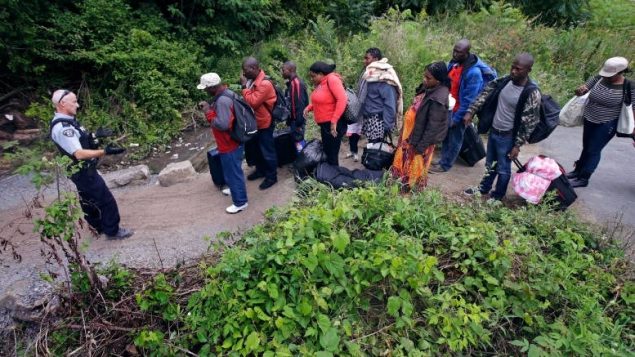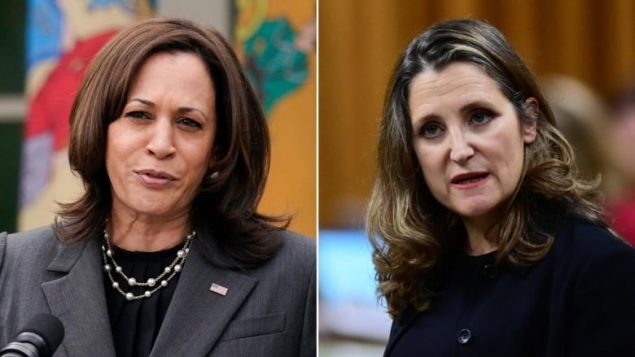Deputy Prime Minister and Finance Minister Chrystia Freeland held her first call with U.S. Vice President Kamala Harris on Thursday, discussing a broad range of issues ranging from the COVID-19 economic recovery to relations with China.
Freeland and Harris previously took part in the virtual bilateral meeting between Prime Minister Justin Trudeau and U.S. President Joe Biden on Feb. 23 but this was their first one-on-one phone call.
They spoke about the economic recovery and the “continued need to support entrepreneurs, small businesses, young people, low-wage and racialized workers, the care economy, and women,” according to a readout of the call released by Freeland’s office.
They also discussed the importance of child care as part of the recovery and its importance as an economic driver that helps women participate fully in the economy.
Noted Canadian economist Armine Yalnizyan coined the term “she-session” to describe the disproportionate impact of the economic crisis triggered by the COVID-19 pandemic on women, because female-dominated service-sector jobs were among the first to disappear.
Freeland, who spearheaded the renegotiation of the Canada-U.S.-Mexico Agreement with the Trump administration, also raised with Harris Ottawa’s ongoing concerns about Washington’s protectionist policies that could shut out Canadian companies from bidding on multi-billion U.S. pandemic recovery programs.
“The Deputy Prime Minister highlighted the close economic ties between both countries and the importance of free flowing trade and investment, particularly in the context of ‘Buy America’ proposals,” the redout said.

William Klein (behind R), the acting deputy chief of mission at the US Embassy in Beijing, and Jim Nickel (front R), the charge d’affaires of the Canadian embassy in Beijing, speak to the media outside the Beijing Second Intermediate People’s Court in Beijing on March 22, 2021, after being refused access to try and attend the trial for Michael Kovrig, a Canadian detained more than two years ago in China on espionage charges. (Nicolas Asfouri/AFP via Getty Images)
Freeland and Harris also “highlighted the unacceptable arbitrary detention of Michael Kovrig and Michael Spavor and that both countries continue to demand their immediate release,” the readout said.
The two Canadians have been tried on charges in espionage and are awaiting a court verdict.
Kovrig, a former Canadian diplomat, was arrested in Beijing on Dec. 10, 2018, on the same day Chinese authorities arrested Canadian entrepreneur Michael Spavor in the northeastern city of Dandong.
Their arrest was widely seen as retaliation for Canada’s arrest of Chinese high-tech executive Meng Wanzhou.
Meng, the chief financial officer of Huawei Technologies Co., was arrested in Vancouver on Dec. 1, 2018 upon the request of U.S. authorities. The 48-year-old daughter of Huawei founder Ren Zhengfei is wanted in the U.S. on charges of committing fraud related to the company’s dealings with Iran.
Meng’s arrest set off a diplomatic showdown between Canada and China, and Ottawa is caught in the fight between Beijing and Washington.

A Royal Canadian Mounted Police officer informs migrants of their rights at a known irregular entry point into Quebec from the U.S, Aug. 7, 2017. (Charles Krupa/Associated Press)
The two leaders also spoke about the migration issue.
Biden on Wednesday named Harris to lead U.S. efforts with Mexico and Central American countries to try to stem the flow of migrants to the United States.
“The Vice President raised issues around migration and both leaders agreed on the importance of addressing the root causes and the need for people to have real opportunities at home,” the statement said.
Attempts by the Trump administration to restrict immigration to the U.S. and crack down on undocumented migrants resulted in tens of thousands of people crossing the border to seek asylum in Canada.
Freeland also thanked Harris for the loan of 1.5 million doses of the AstraZeneca vaccine, which Canada expects to receive next week.







For reasons beyond our control, and for an undetermined period of time, our comment section is now closed. However, our social networks remain open to your contributions.